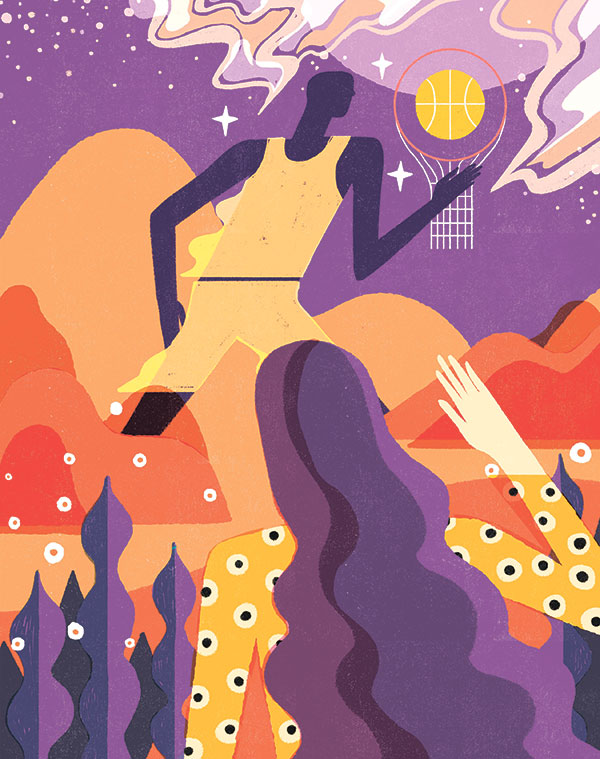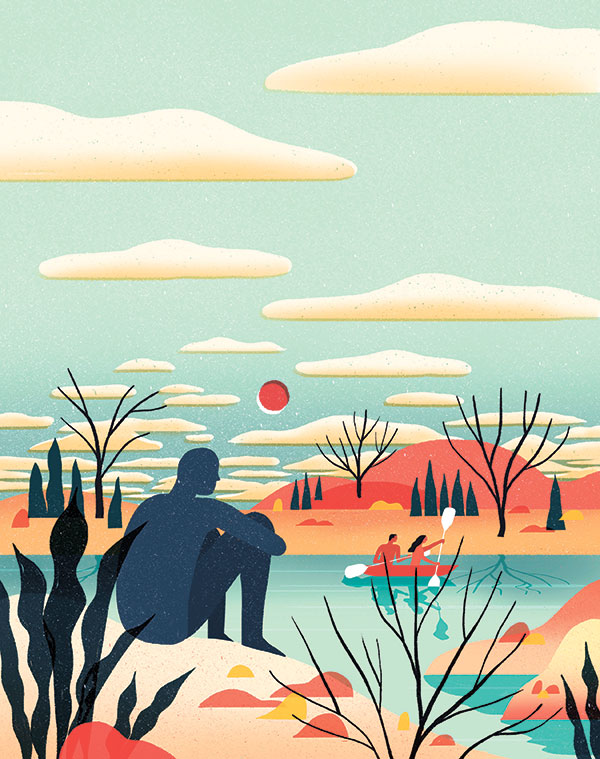Talk About Athletics
By Johanna Michelle Lim
WHO would’ve thought there would be a day when I would cry about Kobe Bryant? Or talk about Kobe Bryant. Or have him be the protagonist of an essay, a sanctum on paper I hold sacredly, and where very few have entered.

To write about someone is the most arresting form of intimacy I know. And I have given this, this combination of words and sentiment, to someone whose only connection to me is he his arrival at a pivotal time in my 10-year old life.
But here he is. And here I am, bawling in front of the laptop at indecent hours in the morning. Everyone is asleep. There is only me and Kobe. I watch him in secret, in subdued volume, as he makes a speech to wrap up his 20-year career.
I replay his best moves, watch his documentaries, boo at testimonies that say Lebron Who is better.
Let me be very clear that I’ve forgotten everything I once knew about basketball. Dribbles. Fast plays. Free throws. Those are about the only jargon I know now that would give this piece added credibility.
There was a brief infatuation with the hoops in the fourth grade, the growth spurt of most girls where, for a moment, you become taller than boys. We also happened to live across a basketball court.
But mostly, my relationship with basketball was through the TV, with pixels of men in jerseys running across the hard court. My grandfather would watch the NBA or PBA in the only television we had at home while I wait for the game to finish. The fourth quarter signaled that I could switch the channel to Nickelodeon soon. Overtime meant, annoyingly, extra waiting time.
Players, whoever they were, scurried around the court. I never knew who was winning, taking a signal from my grandfather who cheered and booed for men in red and blue.
Basketball, very quickly, became a medium to get his approval. When he cheered, I cheered. When he slapped his hand on the table, I showed disappointment too.
San Miguel. Alaska. Chicago. Utah. It didn’t really matter. These were teams I inherited from the man as I slowly learned who the point guards were, what the forward did, or what a jump shot looked like.
Mostly, I focused on my grandfather’s arm around my shoulder as we watch a halftime advertisement, the only form of tenderness he showed to a granddaughter he was perhaps confused how to treat. My brother, six years older and the first grandchild, had a more natural relationship with him. But very early on, I realized that the same dynamic couldn’t transition to me.
I learn from relatives that my grandfather was the MVP of his high school basketball team, as well as an awarded academic and Corps Commander of their Citizens Army Training.
But while my brother was attracted to the discipline these positions required, I was more attracted to his artistry. I watched him silk-screen calendars and practice calligraphy, the terrace always full of broken pen nibs and Tulco paint.
In his professional life, he was a Regional Auditor for the Central Bank, traveling from place to place to keep rural players in check. Wherever we traveled, he always seemed to know someone, a friend or two who would invite him for a drink. He knew everybody, and everyone seemed to know him.
Athlete. Artist. Accountant. Socialite. A well-balanced combination of left brain and right brain. To a child, he could do no wrong. He was a Renaissance Man, excelling in whatever he touched.
But that also made him untouchable. He became too pedestaled to be real. My relationship with him was from a safe distance, an audience to his magnanimity.
My grandfather passed away the same year the Chicago Bulls clinched the 1998 playoffs. It was also the Michael Jordan’s retired as a professional baller, so he said. Both of these events happened too prematurely before I got the chance to stand feet to feet with them, to appreciate conversations as an adult would. I imagined a day where I would talk to my grandfather about statistics, or where I would smartly point out an opponent’s lapse in defense.
Together, the basketball world and I grieved over these men, and our grief turned into a collective line of questioning. What’s next? How do you replace what’s irreplaceable? The TV was now my sole domain but ESPN was never the same.
Then a lanky, self-assured 17-year old was drafted into the NBA. He was ambitious and went against some of the best in the league early on. Very quickly, the critics took notice of the similarity between the kid and Jordan, and how a student to mentor bond was forming in the sidelines. Could he be the next one?
Jersey No. 8 trudged through game after game the same way he trudged through life, my 10-year old self imagined, breaking records and making enemies along the way. His arrogance was a contrast to the humility of the greatest player of the century but even Jordan has been reported to say that he “loves that dude. He’s a warrior.”
Oh, he was controversial for sure. His youth made him unapologetic. He egged on the crowd, stood on scorer’s tables during victories. His energy was infectious. He had a moth-to-flame quality to a kid who just came from an injury and was equally eager to take over the throne of multiplicity her grandfather sat in. Crossing all logical comparisons, Kobe could very well be me.
I followed Kobe’s career until such time that writing replaced my love for athletics. The two couldn’t seem to reside in the same plane. For a time, I took this as a deficiency. If my grandfather could hone so many abilities all at once, why can’t I?
Prior to committing to writing were other tried creative pursuits as well. Design. Calligraphy. Entrepreneurship. All, save for an interest in numbers, were silent homages to a shadow that still stretched far alongside mine.
The next I would see the purple and yellow jersey is in my newsfeed. Kobe looks up at a montage of his 20-year career, including a farewell from his mentor. By now, his energy has waned. He smiles like someone who has lived through defeats. Still insatiable, but resigned to the notion of a career cut short.
Compared to his youthful exuberance, the mature Kobe is vulnerable. He would never be in the same level as MJ, his five championships short of Jordan’s six.
That is how it is about everyone’s shadows perhaps. They never really go away, and in an effort to hold on to their tutelage, nor would you want them to. Kobe will never be Jordan. I will never be my grandfather.
Their influence though often strike an appreciation for an eclipse in the self; for the needed symmetry of both shadow and light, and the enduring play of both.
That push and pull somehow absolved itself with the retirement of a symbol. The end to an era. Through megabytes, as Kobe waves goodbye to the crowd, I wave goodbye to a lost childhood self.
The next day, I wake up with swollen eyes and a hoarse voice. “What happened to you?”, my mother asks, confused whether to comfort or be alarmed. Equally off put was she when I groggily answer, “Basketball.”




hahaha. I love the ending. Will send my basketball piece soon. 🙂 Beautiful essay here, my dear. 🙂
I was “Equally off put” 🙂 I almost fell from my chair. 🙂